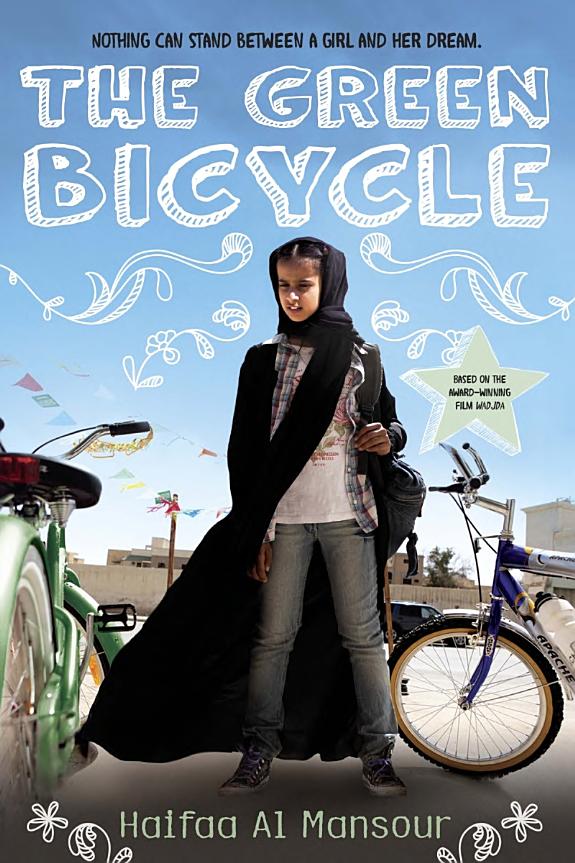
Armchair travel around the world!
Start your reading adventures with our FREE Reading Atlas.

- Around the World in 14 Books
- 7 Thrilling Book Series
- 6 Audiobooks That Are Like Theater For Your Ears



This coming-of-age story (368 pages) was published in April of 2016 by Puffin Books. The book takes you to Riyadh, Saudi Arabia. David read The Green Bicycle and loved it; it wouldn't be on our site if he didn't recommend it.
This is a coming-of-age story about a young girl desperate for the freedom to ride a bicycle in a world determined to keep her contained.
Set anywhere else, the setup of this story wouldn’t amount to much: A spunky 11-year-old girl named Wadjda is living a life in Riyadh. She goes to school, spends time with her family, and plays with friends. But one day, she sees a green bicycle, and making that bike her own soon consumes her thoughts.
You can see where the narrative is likely going. Wadjda will somehow save some money — maybe she will get a job or ask her parents for help — and soon, she’ll be proudly riding up and down the streets of her neighborhood.
This novel does a brilliant job of explaining why it’s not that easy in Saudi Arabia.
For starters, her family struggles financially. She and her mother are mostly alone; her dad works on an oil rig and is often away at work. And, it turns out, because he’s romancing a second wife — wife number one cannot provide him with a son.
Sure, we know that polygamy exists; it’s legal in 58 sovereign states around the world. But this book forces us to slow down and think about specific, personal moments, to unpack what that means for real people. What does his wife think and feel when he announces he’s marrying someone else in hopes of having a son? Or, how does it feel to be a daughter who loves — and maybe idolizes — a father who marries another woman? He doesn’t leave your family, but he’s not fully present either; he just adds another family to the mix.
This book is a great read for all ages because it reads easy like YA, but when you pause to hear what’s being said, it punches like an adult book, reminiscent of To Kill a Mockingbird in the way its young protagonist elicits adult contemplation.
As Wadjda works to acquire the green bicycle, we get an inside look at Saudi culture and society. She is very decidedly not meant to ride a bike. Teachers have conversations about it; the other kids taunt her. Her mother says, ‘You won’t be able to have children if you ride a bicycle.’
This book is an adaptation of a film called Wadjda — the movie’s director Haifaa Al Mansour wrote both the book and the screenplay. About the women in her movie, she said, ‘I couldn’t make a film where women are all innocent, and they’re all striving to be free and all that; it’s not real. I think a lot of women are the gatekeepers, a lot of women reinforce the values… For me, it was not making women all the victims, and men are the oppressors.’
In both the book and the film, Wadjda perseveres in quest. The end result is both expected and a more ambivalent conclusion than we might hope. But if you’re eager to understand everyday life in the Kingdom, this is an engaging place to start.
The warm smell of cardamom and saffron teased Wadjda awake. Traditional blond Saudi coffee was boiling in the kitchen, and she could hear the soft sounds of her mother moving from room to room, preparing for the day ahead.
Wadjda loved the familiarity of their house. It was old and cozy, the place where she’d been born. She couldn’t imagine living anywhere else. Of course, it wasn’t perfect. The walls were so thin that the slightest noise echoed through the whole space. The electricity went out now and then, sometimes because her mother didn’t pay the bill, but mostly because a fuse blew or a switch broke. Over time, Wadjda had learned to fix these things. Between the constant repairs and the monthly mortgage, her mother was always complaining about the house being a money pit. But while their home had its issues, it was Wadjda’s safe spot, the only place where she and her mother could be themselves, relaxed and happy and tucked away from the world outside. — Haifaa Al Mansour
Wanna help us spread the word? If you like this page, please share with your friends.
Strong Sense of Place is a website and podcast dedicated to literary travel and books we love. Reading good books increases empathy. Empathy is good for all of us and the amazing world we inhabit.
Strong Sense of Place is a listener-supported podcast. If you like the work we do, you can help make it happen by joining our Patreon! That'll unlock bonus content for you, too — including Mel's secret book reviews and Dave's behind-the-scenes notes for the latest Two Truths and a Lie.
Join our Substack to get our FREE newsletter with podcast updates and behind-the-scenes info — and join in fun chats about books and travel with other lovely readers.

We'll share enough detail to help you decide if a book is for you, but we'll never ruin plot twists or give away the ending.
Content on this site is ©2026 by Smudge Publishing, unless otherwise noted. Peace be with you, person who reads the small type.